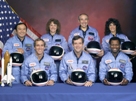
Challenger's Crew Remembered, 25 Years After Disaster
Friday's memorial ceremony at the Kennedy Space Center will honor the seven who died Jan. 28, 1986, and other astronauts, including the Apollo 1 crew.
Friday morning at 9 a.m. EST, a memorial ceremony will be held at the Kennedy Space Center in Florida to honor the seven astronauts who died 25 years ago to the day aboard space shuttle Challenger. The ceremony by the Astronauts Memorial Foundation will remember all U.S. astronauts who have died during the history of the space program, including the three Apollo 1 crewmen who died Jan. 27, 1967, in a fire in their capsule during a test.
The Challenger disaster occurred only 73 seconds after the shuttle launched that morning with Mike Smith, Dick Scobee, Ron McNair, Ellison Onizuka, Christa McAuliffe, Greg Jarvis, and Judith Resnik aboard. An o-ring failure in the right solid rocket booster caused the explosion, with investigators determining that cold weather at launch was a contributing factor. But the federally appointed commission that investigated the loss also faulted NASA's "silent safety program," as the commission's report described it.
Its lengthy report said the Commission was "concerned about the symptoms that it sees. The unrelenting pressure to meet the demands of an accelerating flight schedule might have been adequately handled by NASA if it had insisted upon the exactingly thorough procedures that were its hallmark during the Apollo program. An extensive and redundant safety program comprising interdependent safety, reliability and quality assurance functions existed during and after the lunar program to discover any potential safety problems. Between that period and 1986, however, the program became ineffective. This loss of effectiveness seriously degraded the checks and balances essential for maintaining flight safety."
The commission cited April 3, 1986, testimony by space shuttle program manager Arnold Aldrich at a public hearing in Washington, D.C., where Aldrich described five communication or organization failures that affected the decision to launch the Challenger that day. "Four of those failures relate directly to faults within the safety program," the report stated. "These faults include a lack of problem reporting requirements, inadequate trend analysis, misrepresentation of criticality and lack of involvement in critical discussions. A properly staffed, supported, and robust safety organization might well have avoided these faults and thus eliminated the communication failures."